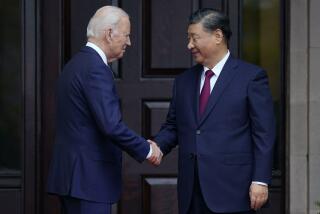Chinese Official Predicts Thaw in White House Ties : Diplomacy: The foreign minister says he expects more high-level contacts. His remarks indicate the U.S. may ease restrictions on dealings with Beijing.
- Share via
WASHINGTON — In a new sign of improving Sino-American relations, Chinese Foreign Minister Qian Qichen predicted Saturday that his groundbreaking visit to Washington will be the first in a series of new high-level meetings between U.S. and Chinese leaders.
“I believe that in the future, there will be more contacts and more visits between our two countries,” the Chinese foreign minister said at a news conference in Washington. “And so, this is the purpose of my visit.”
The foreign minister’s remarks suggest that the Bush Administration may be planning to further ease restrictions on meetings with high-level officials of the Chinese government. The rules were imposed in June, 1989, two weeks after China’s crackdown on pro-democracy demonstrations in Beijing.
Qian’s news conference, held in a luxurious Washington hotel, attracted a demonstration by about 10 Chinese students, including the wife of a pro-democracy activist who last month was charged in China with spreading counterrevolutionary propaganda during the 1989 upheavals.
“The Chinese foreign minister represents the Beijing government,” said one demonstrator, University of Pennsylvania student Ye Ning. “I don’t see any difference between Qian Qichen and (Chinese Premier) Li Peng. Maybe Mr. Qian has better manners.”
At the news conference, Qian deflected questions about China’s human rights policies by pleading ignorance. He asserted that even he, as foreign minister, does not know much about China’s internal political situation--and that Secretary of State James A. Baker III and other U.S. officials know even less.
“I said to Secretary Baker that he could not have a very clear idea of what is going on in China,” Qian said. “Actually, as foreign minister of China, I’m not very clear about all of the internal affairs of China. And I believe that his idea of China is less clear than mine.”
Qian acknowledged that Bush Administration officials have told him that human rights concerns are among the cornerstones of American foreign policy.
“And we say that we respect your cornerstone, and you can regard it as your cornerstone,” he said. “But for China, the cornerstone of its foreign policy is its independent foreign policy of peace.”
Over the last 18 months, U.S. officials have generally boycotted trips to Beijing, breaking the pattern of the last decade, during which American presidents and Cabinet members regularly streamed to the Chinese capital.
Since the 1989 crackdown, the only top-level Administration officials known to have visited Beijing were National Security Adviser Brent Scowcroft and Deputy Secretary of State Lawrence S. Eagleburger. The men made secretive trips last year aimed at bringing about a reconciliation with the Chinese leadership.
During his talks in Washington, Qian said, he invited Baker and Undersecretary of State Robert M. Kimmitt--one of Baker’s closest confidants and the State Department’s third-ranking official--to visit Beijing.
“The more (U.S. officials), the better,” Qian said.
In recent days, U.S. officials have confirmed only two upcoming missions to Beijing, both by officials responsible for dealing with specific sore points in U.S.-China relations.
One trip will be made by Assistant Secretary of State Richard Schifter, who is responsible for human rights issues, and the other by Undersecretary of State Reginald Bartholomew, who oversees efforts to prevent the spread of nuclear technology and missiles.
More to Read
Sign up for Essential California
The most important California stories and recommendations in your inbox every morning.
You may occasionally receive promotional content from the Los Angeles Times.












